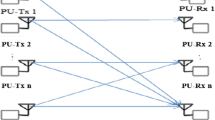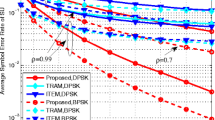Abstract
Spectrum sharing cognitive radio aims to improve the spectrum efficiency via sharing the spectrum band licensed to the primary user (PU) with the secondary user (SU) concurrently provided that the interference caused by the SU to the PU is limited. The channel state information (CSI) between the secondary transmitter (STx) and the primary receiver (PRx) is used by the STx to calculate the appropriate transmit power to limit the interference. We assume that this CSI is not only having channel estimation errors but also outdated due to feedback delay, which is different from existing studies. We derive closed-form expressions for the ergodic capacities of the SU with this imperfect CSI under the average interference power (AIP) constraint and the peak interference power (PIP) constraint. Illustrative results are presented to show the effects of the imperfect CSI. It is shown that the ergodic capacity of the SU is robust to the channel estimation errors and feedback delay under high feedback delay. It is also shown that decreasing the distance between STx and secondary receiver (SRx) or increasing the distance between STx and PRx can mitigate the impact of the imperfect CSI and significantly increase the ergodic capacity of the SU.





Similar content being viewed by others
Notes
For Jakes’ [17] model, the channel recorrelates after it becomes uncorrelated and the highest \(|\rho |\) is equal to 0.4. However, in Sects. 3 and 4, we show that the ergodic capacity of the SU depends on \(\rho ^{2}\), and in Sect. 5, we show that for \(0\le \rho \le 0.4\), the ergodic capacity of the SU changes negligibly. Therefore, similar to most of existing studies [18], we assume once \(\rho \) is equal to zero, \(\rho \) remains zero at all higher \(\tau \) and \(0\le \rho \le 1\).
References
Haykin, S. (2005). Cognitive radio: Brain-empowered wireless communications. IEEE Journal on Selected Areas in Communications, 23(2), 201–220.
Zhang, R. (2009). On peak versus average interference power constraints for protecting primary users in cognitive radio networks. IEEE Transactions on Wireless Communications, 8(4), 2112–2120.
Gastpar, M. (2004). On capacity under received-signal constraints. Communication, Control Comput: In Annual Allerton Conf.
Ghasemi, A., & Sousa, E. (2007). Fundamental limits of spectrum-sharing in fading environments. IEEE Transactions on Wireless Communications, 6(2), 649–658.
Musavian, L., & Aissa, S. (2009). Capacity and power allocation for spectrum-sharing communications in fading channels. IEEE Transactions on Wireless Communications, 8(1), 148–156.
Musavian, L., & Aissa, S. (2010). Effective capacity of delay-constrained cognitive radio in nakagami fading channels. IEEE Transactions on Wireless Communications, 9(3), 1054–1062.
Medard, M. (2000). The effect upon channel capacity in wireless communications of perfect and imperfect knowledge of the channel. IEEE Transactions on Information Theory, 46(3), 933–946.
Musavian, L., & Aissa, S. (2009). Fundamental capacity limits of cognitive radio in fading environments with imperfect channel information. IEEE Transactions on Communications, 57(11), 3472–3480.
Duan, R., Jantti, R., Elmusrati, M., & Virrankoski, R. (2010). Capacity for spectrum sharing cognitive radios with MRC diversity and imperfect channel information from primary user. In IEEE Global Communications Conference (GLOBECOM).
Sboui, L., Rezki, Z., & Alouini, M. (2013). A unified framework for the ergodic capacity of spectrum sharing cognitive radio systems. IEEE Transactions on Wireless Communications to be published.
Suraweera, H. A., Smith, P. J., & Shafi, M. (2010). Capacity limits and performance analysis of cognitive radio with imperfect channel knowledge. IEEE Transactions on Vehicular Technology, 59(4), 1811–1822.
Kim, H., Wang, H., Lim, S., & Hong, D. (2012). On the impact of outdated channel information on the capacity of secondary user in spectrum sharing environments. IEEE Transactions on Wireless Communications, 11(1), 284–295.
Xu, D., Feng, Z., & Zhang, P. (2013). Effective capacity of delay quality-of-service constrained spectrum sharing cognitive radio with outdated channel feedback. Science China Information Sciences. doi:10.1007/s11432-013-4805-x.
Chen, J., Si, J., Li, Z., & Huang, H. (2012). On the performance of spectrum sharing cognitive relay networks with imperfect CSI. IEEE Communications Letters, 16(7), 1002–1005.
Peha, J. (2005). Approaches to spectrum sharing. IEEE Communications Magazine, 43(2), 10–12.
Kang, X., Garg, H., Liang, Y.-C., & Zhang, R. (2010). Optimal power allocation for OFDM-based cognitive radio with new primary transmission protection criteria. IEEE Transactions on Wireless Communications, 9(6), 2066–2075.
Jakes, W. (1974). Microwave Mobile Communications. New York: Wiley.
Simon, M. K., & Alouini, M. S. (2000). Digital communication over fading channels. New York: Wiley.
Xu, D., Feng, Z., Li, Y., & Zhang, P. (2011). Outage probability minimizing power/rate control for cognitive radio multicast networks. In IEEE Global Communications Conference (GLOBECOM).
Gradshteyn, I., & Ryzhik, I. (2007). Table of integrals, series, and products. Washington: Academic Press.
Gao, X., Zhang, J., Liu, G., Xu, D., Zhang, P., Lu, Y., et al. (2007). Large-scale characteristics of 5.25 GHz based on wideband MIMO channel measurements. IEEE Antennas and Wireless Propagation Letters, 6(6), 263–266.
Acknowledgments
This work was supported by the 973 Program (2009CB320400), Sino-Finland ICT Collaborations Program (2010DFB10410) and European COST Action IC0902 Project.
Author information
Authors and Affiliations
Corresponding author
Rights and permissions
About this article
Cite this article
Xu, D., Feng, Z. & Zhang, P. On the Impacts of Channel Estimation Errors and Feedback Delay on the Ergodic Capacity for Spectrum Sharing Cognitive Radio. Wireless Pers Commun 72, 1875–1887 (2013). https://doi.org/10.1007/s11277-013-1100-5
Published:
Issue Date:
DOI: https://doi.org/10.1007/s11277-013-1100-5




